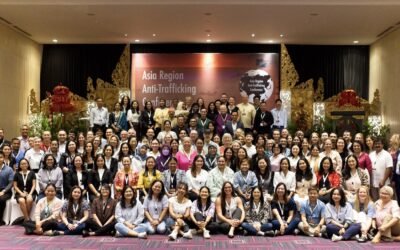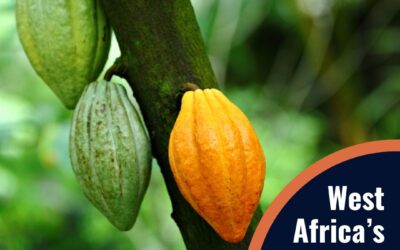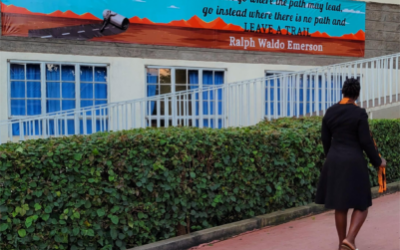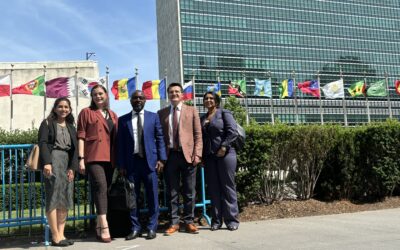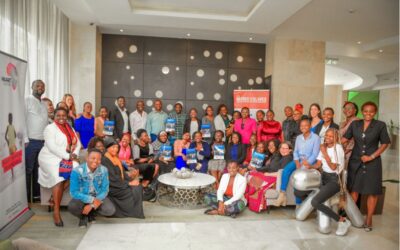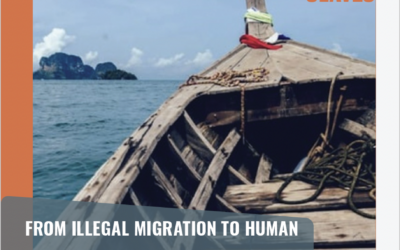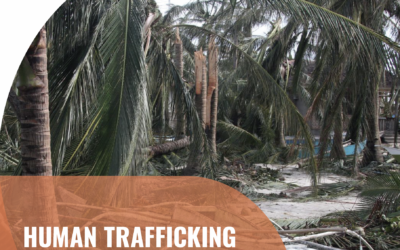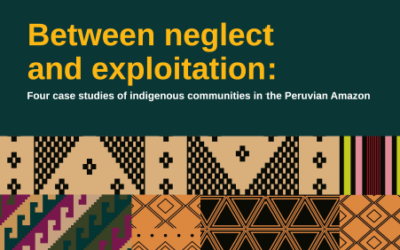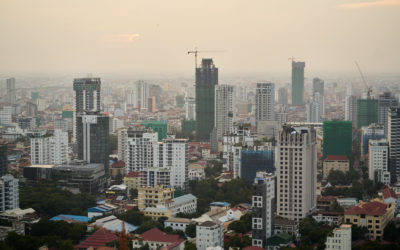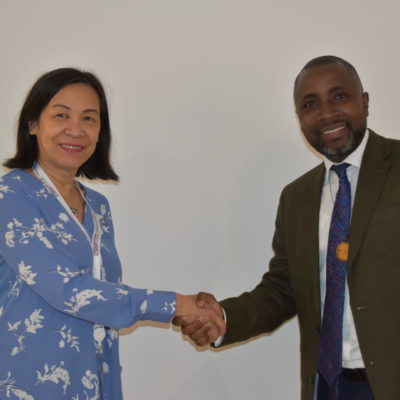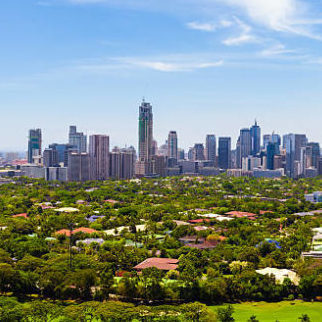In July and August 2024, Free the Slaves participated in regional anti-slavery discussions in Asia, participating in key events focused on combating human trafficking and child exploitation. These events focused around collaboration and knowledge-sharing, addressing modern slavery in some of the most vulnerable regions of the world.
Research, Monitoring & Evaluation
Harsh Realities of Forced Labor and Child Labor in West Africa’s Cocoa Industry
The newly released reports on Nigeria and Ghana offer an in-depth examination of how forced labor and child labor continue to underpin cocoa production in these countries. Despite being among the top cocoa producers globally, Nigeria and Ghana have long struggled with the dark side of this industry.
New Insights on Dangerous Journeys: Updated Research Report on Migrant Smuggling and Human Trafficking
The updated report provides extensive evidence on the intersection between illegal migration and human trafficking across three legs of the journey: Djibouti and Somalia, Yemen, and the Gulf monarchies. This evidence is illustrated through detailed narratives and synthesized graphics that highlight the dynamics of exploitation and risk factors.
Are We Truly Listening and Moving Forward Together?
Hey there, fellow advocates and allies in the anti-trafficking movement! Today, let's dive into an important question: Are survivors' voices truly being heard? Recently, a groundbreaking research report from Free The Slaves and HAART Kenya brought survivors of human...
UN Security Council Research
On Tuesday, June 4th, Free the Slaves and the University of Nottingham Rights Lab launched their joint report, “Modern Slavery and the United Nations Security Council” at the Church Center for the United Nations in New York, New York. This exciting event began at 2 PM...
Survivors and Organizations Working Together Against Human Trafficking: Insights from East and Central Africa
People who have been directly affected by a certain issue are the ones who best know its root causes, consequences, implications, and dynamics. They are also the ones who best know what the solutions to that issue may be. In virtue of their unique knowledge through...
From Illegal Migration to Human Trafficking: Dangerous Journeys Across the Horn of Africa and the Arabian Peninsula
There is an urgent need to address the multiple conditions that lie behind migration from the Horn of Africa to the Gulf Monarchies. The journey from the Horn of Africa through Yemen and onwards to the Gulf monarchies accounts for 40% of all migratory movements...
Human Trafficking and Climate Change: Understanding Intersections and Strengthening Responses in the Philippines
It is increasingly recognized that climate
change also contributes to (and is contributed by) human trafficking.
Between Neglect and Exploitation: Modern Slavery in Peru
A recent study on modern slavery in Peru conducted by Free the Slaves and ONOTZI in the Peruvian Amazon’s regions of Ucayali and Huánuco uncovers the harsh realities of four Indigenous communities.
Learning From NGOs’ Approaches to Modern Slavery in Southeast Asia
Upon surveying civil society organizations across Southeast Asia, Free the Slaves has published a report, ‘Learning from NGOs’ Approaches to Modern Slavery in Southeast Asia’. Groups working to counter modern slavery in this region and beyond can learn from FTS’s...
Free the Slaves Partners with Three New Organizations in Vietnam
Free the Slaves is excited to announce our new partnerships in Vietnam. These partnerships will allow us to understand more about the country and its need to have more players in the human trafficking space. These partnership endeavors are essential for developing...
Free the Slaves Partners with Three Filipino Organizations
Free the Slaves is excited to announce new partnerships with local organizations in the Philippines. These partnerships will allow us better to understand the context of slavery in the Philippines and strengthen our efforts to combat it. We partner with the Balaod...
Understanding the Modern Slavery Landscape of the Middle East and North Africa
Women, children, migrants, refugees, and other minorities are especially vulnerable to human rights violations in the Middle East and North Africa (MENA). This vulnerability is magnified by a wide range of factors, including economic instability, conflict, climate...
Cutting the Long-term Costs of COVID-19: Building Resilience Against Exploitation in Senegal and Kenya
To date, the cost of the global COVID-19 pandemic has most frequently been measured in lives lost and the cost to domestic economies, while triumphs have often been charted in terms of vaccine roll-outs and partial or full returns to the ‘freedoms’ outside lockdown. ...
Free the Slaves and the Rights Lab Form New Partnership to Combat Modern Slavery
On this International Day for the Abolition of Slavery, two of the world’s leading antislavery institutions are proud to announce a new partnership to merge research, community activism and global advocacy. Free the Slaves, headquartered in the U.S., and the Rights...
20 Years of Fighting for Freedom
The year 2020 brings several important anniversaries. It’s the 20th anniversary of the United Nations Palermo Protocol, the landmark treaty to confront modern forms of slavery worldwide. It’s the 20th anniversary of the Trafficking Victims Protection Act, the...
Bukeni Tete Waruzi Joins Free the Slaves as Executive Director
Free the Slaves is thrilled to announce that a courageous advocate for the rights of women and children has joined the organization as executive director. Bukeni Tete Waruzi has helped put a Congolese warlord behind bars, has helped women trafficked into domestic...
Canadian Graduate Students Develop New Way to Measure Slavery Resistance
Editor's Note: This dispatch from the field originally appeared on the University of British Columbia's Master of Public Policy and Global Affairs (MPPGA) program website in December. Free the Slaves thanks the university team's remarkable effort to help us improve...
Trafficking’s Footprint Report Unveils Widespread Child Slavery in Ghana
A new research report has uncovered cases of child trafficking and exploitation in six districts of Ghana. Field teams documented more than 500 instances of child trafficking in 20 communities surveyed in 2016, and 107 households with cases of child trafficking in 14...
Shocking Statistics, Encouraging Commitments at United Nations
This week’s release of new estimates on the scope of slavery worldwide are both shocking and encouraging. Shocking because the figures are worse than many experts had believed. But encouraging because the report’s release at the United Nations General Assembly has...
The Importance of Numbers in the Fight Against Slavery
As the United Nations General Assembly convenes this week in New York, an important announcement is coming about modern slavery worldwide. The International Labor Organization (ILO), International Organization for Migration (IOM) and the group Walk Free will be...
FTS Research Inspires Ways to Strengthen Ghana Community Programs
Anti-slavery work demands constant evaluation. That’s why FTS works diligently to improve anti-slavery activities by our grassroots partners through baseline research to examine, contextualize and adapt our program strategies to best suit the needs of individual...
More than 1,000 People Freed From Slavery
Our 2016 annual results demonstrate that Free the Slaves liberates people from slavery and changes the conditions that allow slavery to persist. We’re not only helping people break free, we’re ensuring they stay free and nobody takes their place in bondage. Here is a...
Connecting the Dots in Senegal
In many of the countries where we work, modern slavery is hidden from public view. But not in Senegal. Child slavery here is evident everywhere. Little boys carrying empty plastic margarine containers cluster on street corners and markets all over Dakar, Saint-Louis...
Why I Chose to Research What Slaveholders Think
I often get asked why I wrote a book about contemporary slaveholders. Once people get over the fact that slavery still exists they want to know who on earth is out there, right now doing what it takes to exploit their fellow humans in the worst sort of way? At the...
New Research Indicates High Prevalence of Child Trafficking and Slavery-Like Conditions in Ghana Fishing Villages
Researchers have discovered significant levels of child trafficking and slavery-like conditions in 20 communities in Ghana’s Volta and Central regions. More than one-third of households studied are affected. Teams conducted 80 focus groups, 40 interviews, 20 social...
How Mobile Phones Provide Hope to Slaves in India
How do you reach people enslaved in India to inform them that freedom is possible? Call them!Mobile phones are everywhere in India, with 220 million smartphone users throughout the country. Even in rural areas, where access to technology remains low, there is usually...
Historic Benchmark: 12,000 People Freed from Slavery
Inspiring news to report today: Free the Slaves has liberated 12,000 people from slavery! That's worth saying twice. Free the Slaves has liberated 12,000 people from slavery! People who had been forced to do backbreaking work for no pay, by ruthless criminals who use...
Harvard Study Shows Effectiveness of FTS Community Approach in India
One of the major challenges in the fight against modern slavery is proving that a particular strategy successfully and sustainably liberates people from bondage, and that there's an improvement in socioeconomic conditions in places where slavery has been overcome. A...
Nepal Earthquake Anniversary: Lessons to Fight Traffickers in Disaster Zones
It’s been a year since the 2015 Nepal earthquake killed thousands and left large parts of the country in ruins. One of the key tragedies of the quake’s aftermath is that human traffickers preyed on desperate and vulnerable Nepalis, causing a rise in slavery cases.A...
Improving Anti-Trafficking Work in Conflict and Crisis Situations
What if the response to a natural disaster in the U.S. looked like typical international relief efforts for crises overseas? How effective would it be?“Imagine trying to respond to Hurricane Katrina and having a French NGO, where most of the workers speak French and...
15 Lessons Learned About How to Free Slaves
Free the Slaves is wrapping up our 15th year of fighting for freedom. It's a good time to not only reflect on our most important accomplishment, freeing 10,000 people from slavery. It's also important to distill the lessons we've learned from years of working with...
New Animated Video: Our Formula for Freedom
It takes more than passion and indignation to eradicate the evil of slavery. It takes science. That’s why Free the Slaves has developed our Community Based Model for Fighting Slavery. It’s a four-step formula that guides our work to bring entire communities from...
New Monitoring, Learning & Evaluation Director for Free the Slaves
Free the Slaves is happy to introduce a remarkable new staffer who has recently joined us as the director of monitoring, learning and evaluation. Karen Snyder, Ph.D. has more than 20 years of experience in program planning, implementation and evaluation. She earned...
Free the Slaves Makes History: 10,000 Slaves Freed
The first part of our mission statement is crystal clear: liberate slaves. And with your continuing support, Free the Slaves is achieving that goal. Together, we have just crossed a historic milestone: freeing more than 10,000 people from slavery worldwide since Free...
What Does “M&E” Mean to You?
Google the term “M&E” and you’ll discover it means different things to different people. If you’re a builder, it means mechanical & electrical. If you’re an accountant, it means meals & entertainment. If you’re a filmmaker it means music & effects. And...
New Report Says 36 Million People Enslaved Worldwide
New research from the group Walk Free and FTS Co-founder Kevin Bales estimates there are more people in slavery today than previously thought. The 2014 edition of the Walk Free Global Slavery Index reports that 35.8 million people are enslaved, a 23 percent increase...
Haiti & Ghana Experts Showcase FTS Programs and Evaluation Techniques for USAID
The U.S. Agency for International Development (USAID) is working to integrate anti-trafficking efforts into America’s development projects around the globe. That’s because modern-day slavery can reduce the success of international development efforts. USAID officials...
New Video and Report Showcase Model Communities in Haiti
It’s heartbreaking to learn that rural Haitian families often feel they have no choice but to send some of their children away because they can’t afford to care for them. The restavek system is a longstanding tradition in Haiti, where rural kids are sent to live with...
The Free the Slaves Formula for Freedom
Have you ever wondered just how Free the Slaves helps thousands of people escape bondage each year? Well, now you can read the step-by-step procedures we follow for leading communities from slavery to freedom. Our “Community Based Model for Fighting Slavery” is...
Pioneering New Frontiers in the Fight Against Slavery
“Forging freedom demands the courage to renew and transform.”That’s how the Free the Slaves 2013 Annual Report begins. The report demonstrates that Free the Slaves is thriving as an organization, while embracing the need for change.The report showcases remarkable...
Record-Setting Year for Freeing People From Slavery
We've just completed our 2013 year-end review, and the results are both impressive and inspiring. In partnership with local organizations around the globe, we helped free more people from slavery last year than ever before. Here are the numbers from our frontline work...

